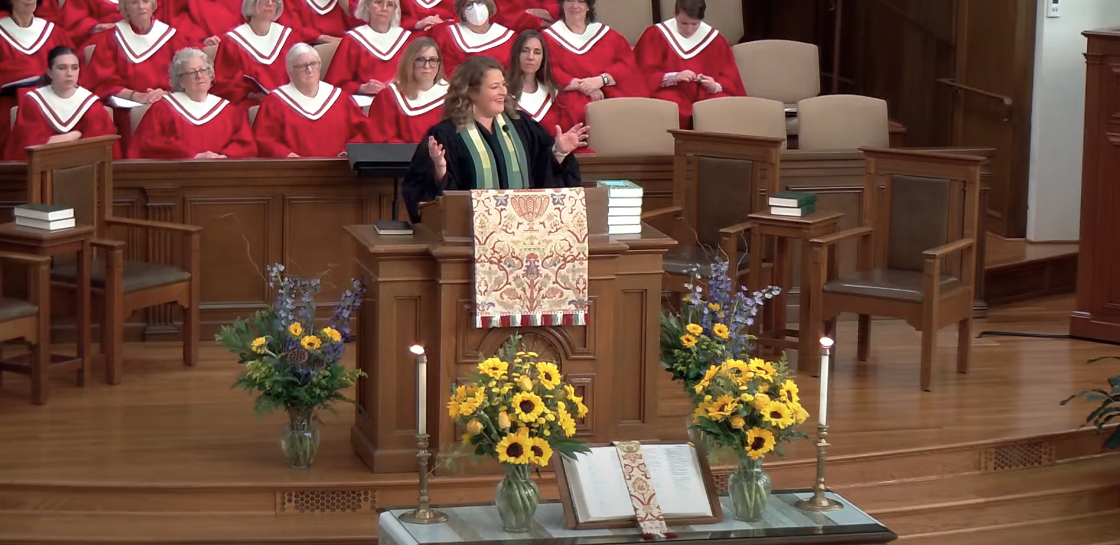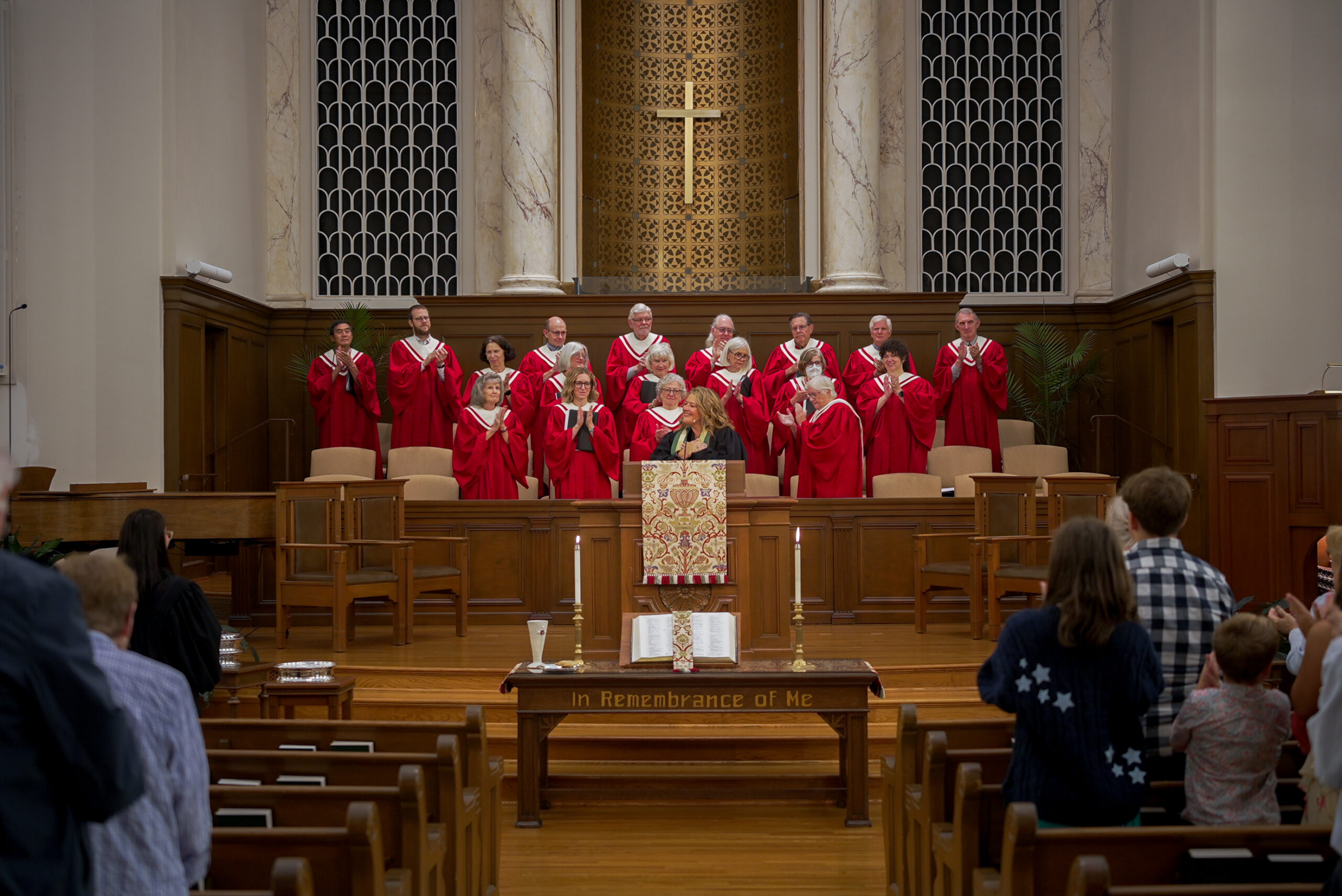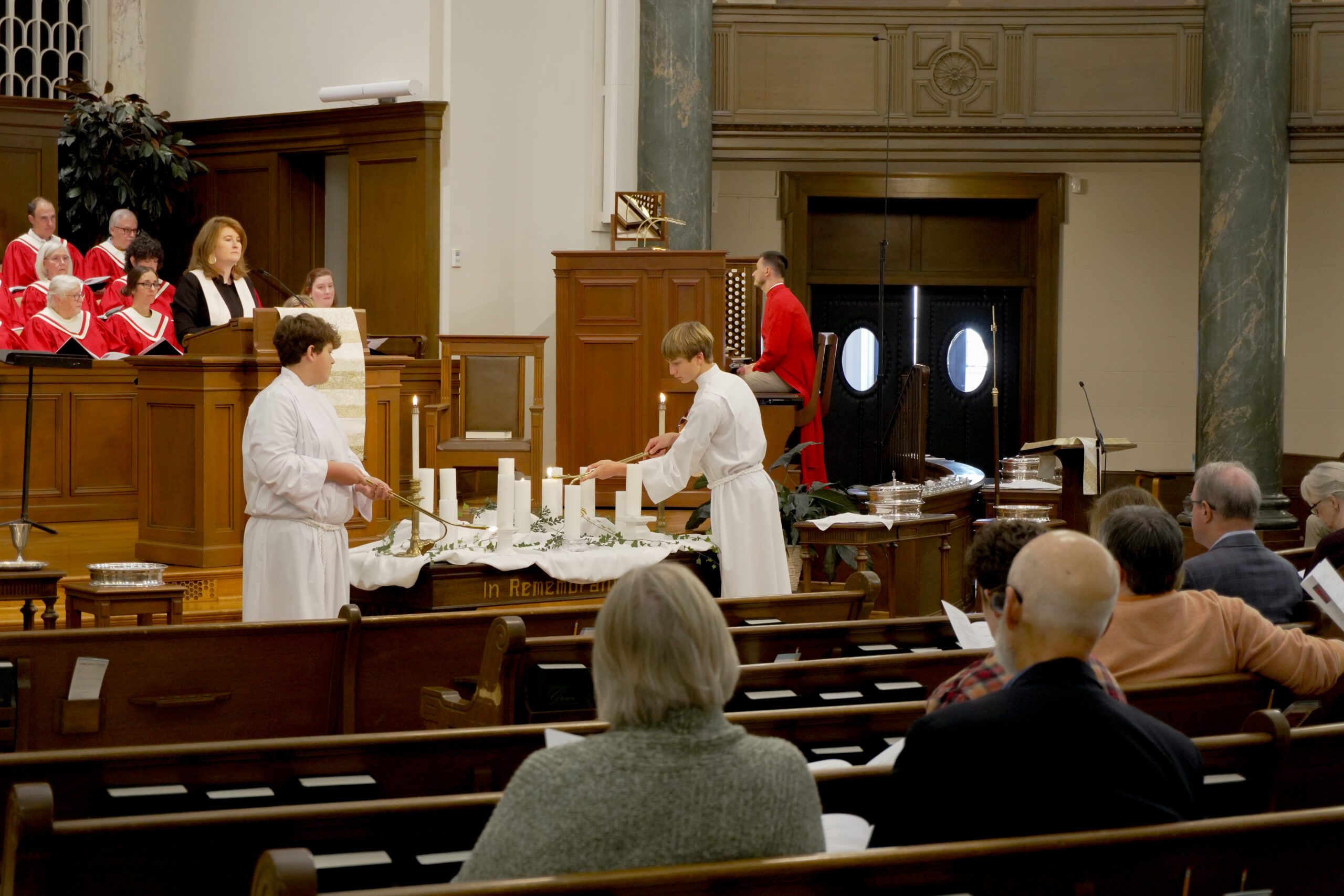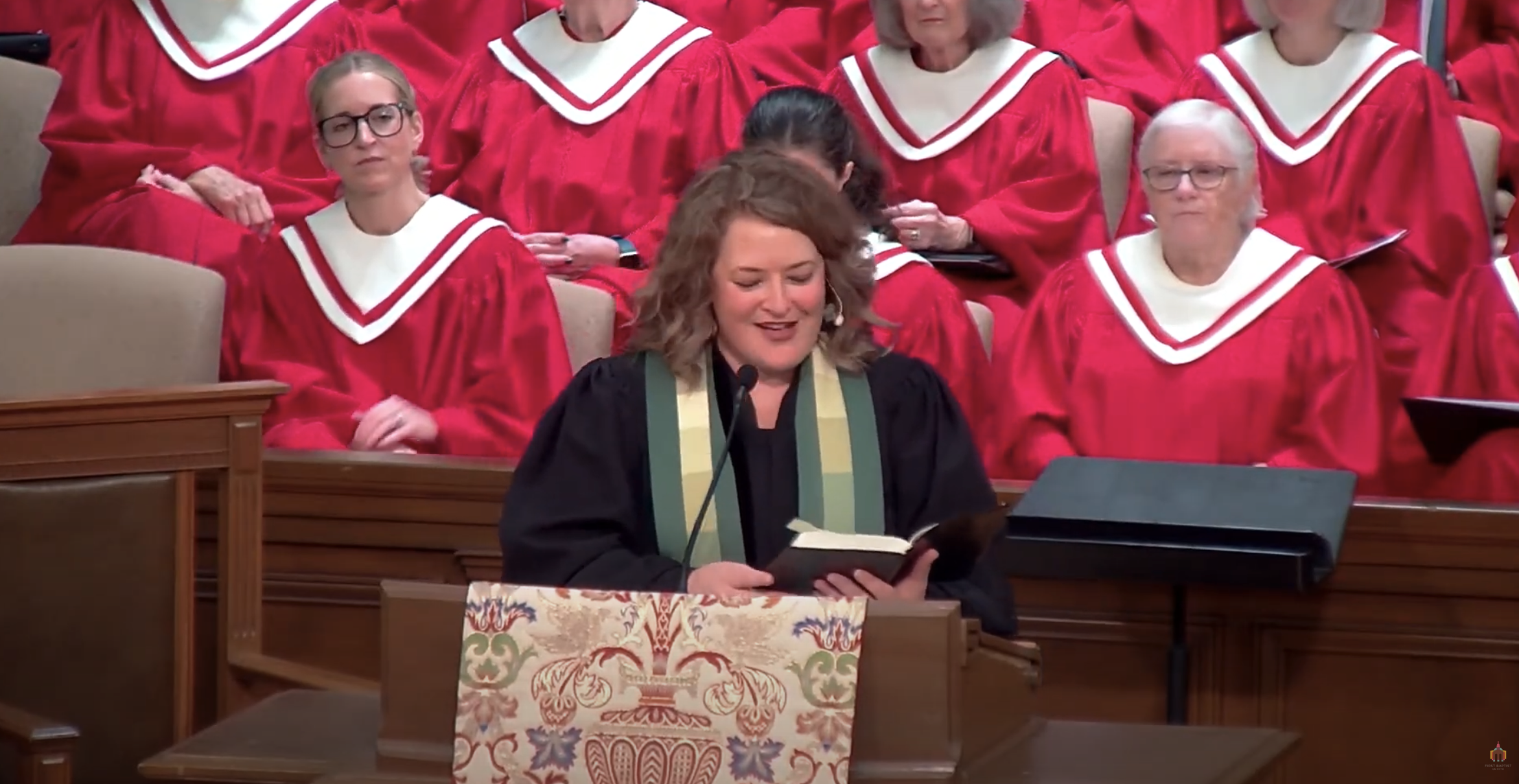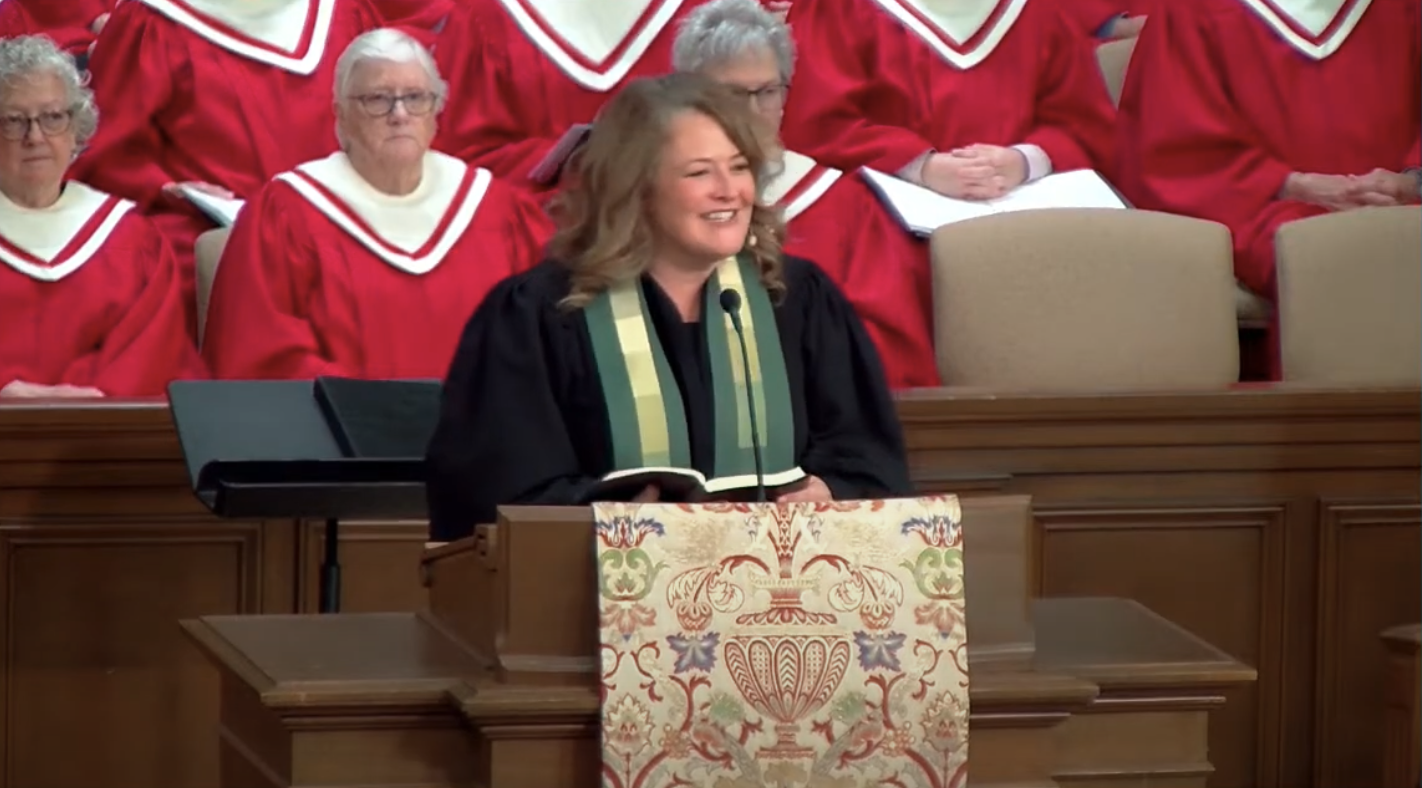I would call myself a sentimental collector. I have the sock monkey one of my great aunts made for me when I was born. I’ve got the Growing Up Girls porcelain figurines my parents got for my birthday each year from the year I was born until I turned 16, including the special high school graduate and bride figurines. The ceramic cow head that hung in my great grandmother’s kitchen my entire life hangs in our kitchen now. I’ve got all the cards Joey and I received for our wedding, all the cards we received upon Sylvie’s arrival and a smattering of other cards and letters from throughout my life. And while many of these “collections” are not displayed around our house or honestly thought about often I cannot quite bring myself to give them away. The sentiment behind the gifts and the memories of the person who wrote the notes and what was happening in my life when I received them, I guess, have a strong grip on my heart and I can’t entertain letting them go.
Inspired by Lena’s sermon last week, when she talked about the mementos we return to throughout life that remind us of who we are and who we can become, I pulled out my folder of the various cards and letters I’ve received over the years wondering what treasures I might find. As I flipped through the very full folder I came across some treasures indeed. A note from my great grandmother written some 15+ years ago in which she said, “I’m so very proud of you. I hope you have a wonderful life ahead of you, healthy and happy in every way.” I tearfully read notes from my grandmother, penned for no other reason than to remind me of her love and prayers for me. I giggled as I revisited the cards my closest friends in seminary wrote when we graduated; recounting three years full of lovely and not so lovely memories and the prayers we shared for one another as we set out on our ministry journeys. I smiled as I opened the first anniversary card from Joey full of hope for the years to come. And then I got to two pieces from my mom.
One was this birthday card. I’m not sure what year I received it but – it features my birth date and a chosen Bible verse to correlate with that day. My card features a verse from Matthew 10:7, “As you go, preach this message: ‘The kingdom of heaven is near.’” My mom started her note in the card, “I have probably had this card for a decade. I feel like there may be a little bit of eye-rolling involved but I do love the fact that your verse tells you to preach…I encourage you to keep this in mind as you begin to look at new chapters in your life.”
The other was this letter Mom wrote to me on my 30th birthday. She wrote, “Dear Mary Thomas – this world doesn’t need more church or more spiritualism. It doesn’t need one more slick televangelist offering prosperous salvation by way of a monthly monetary gift. It doesn’t need any more violent attempts to force people into believing one way or another. It doesn’t need Christians who hold on tight to the past, in hopes that things come back around to the way they used to be. The world needs Jesus.
And Jesus needs followers who willingly let go of anything and everything that does not point directly to Him: the comforts (and aggravations) of home and family, the tenets long held as truth just because ‘it’s always been that way,’ the security of a lucrative career in the business world, the trappings of success…you are an important part of the generation that will bring Jesus – not ritual or empty promises or manmade rules – but Jesus to the world that needs Him.”
What a find as I was preparing this sermon. Can you hear the power and hope the words in these letters hold? This morning we continue our journey through another important letter filled with powerful words that provide hope. For a quick recap – last week we dove into what is traditionally thought of as Paul’s Letter to the Colossians. We heard the standard ancient salutation introducing the writers of the letter and then moved quickly into their thankfulness for the Colossian Christians and all they’ve been doing. Lena helped us understand that in expressing gratitude for the faith and love of the Colossians, the writer is reminding the people that the Good News is indeed bearing fruit and growing in them. She also made real for us the hope the writer imbued into their words that indeed the people could live lives that are fully pleasing to God.
Today as we continue we get a clue as to why the letter is being written and have a mystery solved! While scholars debate Paul’s authorship, we know that whoever penned the letter wrote it for a particular people, in a particular situation, at a particular time. Although the particular problem the Colossians were dealing with isn’t really spelled out until later in the letter it does help frame our scripture for today to highlight that the purpose of this particular letter was to help the church in Colossae deal with popular and problematic teachings and practices that devalued the importance of Christ in the pursuit of a kind of freedom and a level of wisdom that were being promised in the face of the people’s fears.
Before really getting into the nitty gritty of what is happening the writer offers the people a hymn. I can imagine the Colossians might have been a little bit confused. They’ve been dealing with a pretty big issue and are hoping this leader of the Jesus movement is going to give them a solution! They are waiting for sage advice and instead hear what some scholars say is a reinterpreted familiar hymn,
“He is the image of the invisible God, the firstborn of all creation; for in him all things in heaven and on earth were created, things visible and invisible, whether thrones or dominions or rulers or powers – all things have been created through him and for him. He himself is before all things, and in him all things hold together. He is the head of the body, the church; he is the beginning, the firstborn from the dead, so that he might come to have first place in everything. For in him all the fullness of God was pleased to dwell, and through him God was pleased to reconcile all things, whether on earth or in heaven, by making peace through the blood of his cross.”
Why did the writer choose to start the heart of his message this way? What was the purpose of including a hymn before offering advice and solutions to the Colossians’ problems?
There is something special about the hymns of our faith, isn’t there? When I asked the question – what exactly is it about hymns that makes them so special – on social media recently I got responses like, “They tap into a part of our brains that we don’t always have easy access to. They usher us into a place where we don’t have to have everything figured out but we can let the waters of the rhythm and lyrics take us. That radical trust is faith.” Another said, “They remind us we’re part of a story that others share, have wrestled with, written about and sung along with.” Some of you answered, saying, “I think about memories of singing them in church growing up with so many faithful believers who led and influenced me.” And another said, “There’s always a word or sentence that breaks through my ‘wall of coping’ and pierces my heart and leads me to a vulnerable place of tears.” One of you wrote, “They seed our hearts and souls with those who came before us and those who will come after us.” The forward to the hymnal we use on a weekly basis states, “Hymns stir the soul and breach the barriers between our knowledge of God and our inner experience of God. In the singing of hymns, we are able to exalt the mystery of God’s abundant grace and, at the same moment, find our own spirits becoming attuned to God’s spirit. The mystery of God is too awesome for words; with poetry and music, we are able to sing even when we cannot speak” (Celebrating Grace).
Before he could deal with the problems plaguing the Colossian church, the writer offered the people a hymn to ground them in a foundational belief of their faith – Christ is at the center. The writer wanted the people to understand that they can find everything they need in Jesus and that Jesus is able to offer this fullness because he himself is fully God. This beautiful poem was included to remind the Colossians, regardless of what was happening around them; in response to the other teachings they were hearing; to overcome their fears and doubts, they must allow the peace of Christ to rule in their hearts for Christ is everything. Jesus is “ever and always the solution.” This “Christ Hymn” makes clear that, as Nijay K. Gupta wrote, the “great Creator, Ruler and Sustainer became visible, was born a human, died and came back to life and all the while was brimming with Godness in his body.” And this heavenly man is the head of the church.
This language of Christ and body and church is not unfamiliar. In 1 Corinthians we read, “For just as the body is one and has many members, and all the members of the body, though many, are one body, so it is with Christ…the body does not consist of one member but of many…there are many members, yet one body…You are the body of Christ and individually members of it.” We, you and me, the church in Colossae, this church, make up the body of which Jesus is the head. Including this bodily language in their letter is important because with this type of language the writer is reminding the Colossians, and us, that while Christ is fully God, Christ is not just a cosmic presence. He took on flesh, and came to dwell among us. His humanity was real.. Because Jesus lived fully in both the realm of God and the realm of humanity, we can live full lives, continuing securely in our faith without giving attention to false promises of others. We can live in the hope promised in the gospel and in doing the ministry of Christ’s church.
I don’t know about the Colossians but that reassurance – that Christ is everything and that in Christ we have everything; that whatever the problem Christ is the solution could be enough. I think the writer could have ended there. But he does, thankfully, continue on and just at the end of the scripture lesson for today the writer offers these words (as translated in The Message), “This mystery has been kept in the dark for a long time, but now it’s out in the open. God wanted everyone, not just Jews, to know this rich and glorious secret inside and out, regardless of their background, regardless of their religious standing. The mystery in a nutshell is just this: Christ is in you, so therefore you can look forward to sharing in God’s glory.” There it is, friends, the message laid out plain and simple.
While we might not be dealing with the same issues as the Colossians, we each face our own struggles on a daily basis. The rising cost of living, medical bills, crippling anxiety, caring for aging family members, systems of discrimination, and the list goes on and on. It’s easy to let these problems bog us down and to allow these messages of insecurity and lack to resound in our heads. But as we’ve been reminded, in the body of Christ we all belong to a larger community, a global community that doesn’t care about ethnicity or gender or social class or nationality or any other differences. A community that reflects the fullness of God. A community that sings the hymn of Christ not just in worship but in our working and serving and being in the world. And for that we say, thanks be to God!


